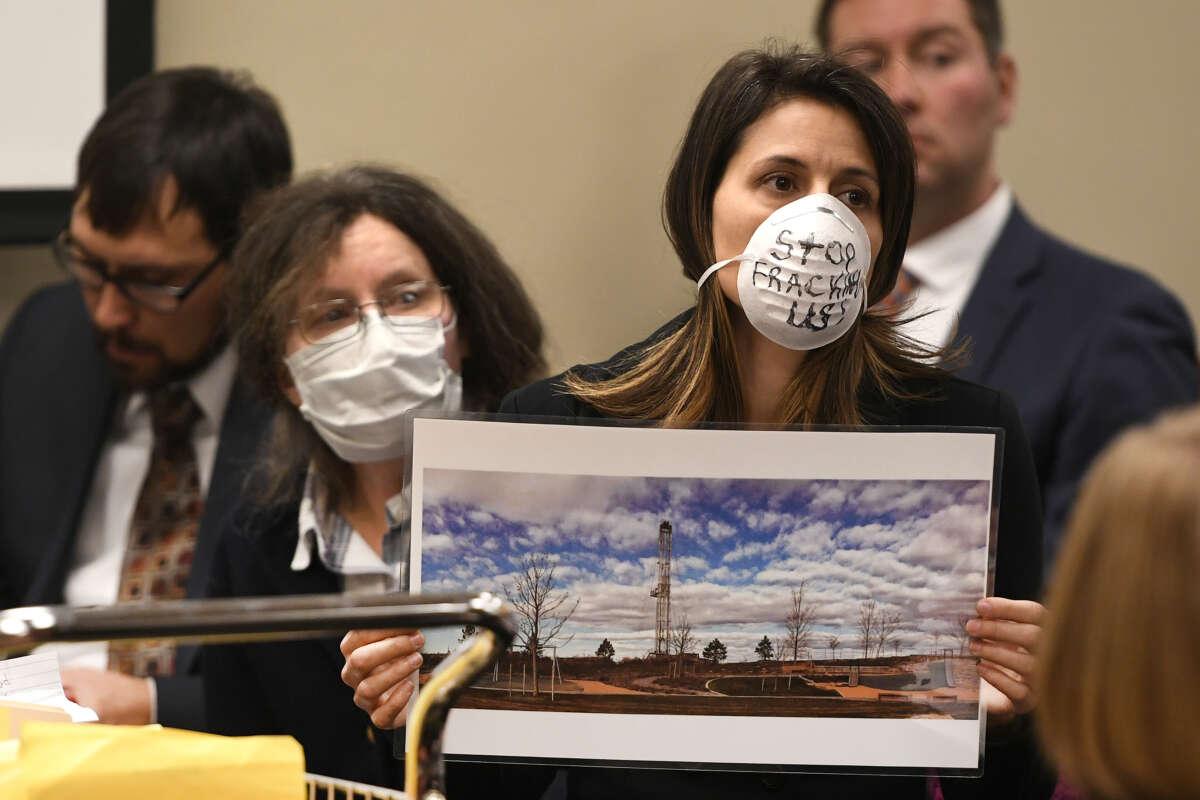Colorado Law Could Force Boulder to Sell Oil and Gas to a Private Company
State regulators could order Boulder County to sell its gas rights without the consent of voters or property owners.

Extraction Oil and Gas, a Denver-based energy company, sent Boulder County an offer this summer. It’s one that local officials don’t want, but can’t refuse.
The company, a subsidiary of one of Colorado’s largest oil and gas producers, , gave the county three options: Sell access to its oil and gas, partner up as a working interest owner or get thrown into a legal process known as “forced pooling,” whereby the state can give a company permission to drill for a nonconsenting owner’s oil and gas.
Boulder, one of Colorado’s most populous counties, is pushing back against the private company’s efforts to extract oil and gas worth millions of dollars. The company is urging the state to give it access to the lucrative minerals, despite the county’s objections. But the county is arguing that the process would be illegal, and that local governments should have the power to reject drilling because of its harmful environmental and health effects.
Colorado established its forced pooling process in 1951 with the intention of reducing helter-skelter drilling, preventing waste and protecting the rights of mineral owners. Many oil and gas producing states have similar for compelling landowners to accept oil and gas operations.
The Colorado Oil and Gas Conservation Commission (), a state regulatory agency that oversees the industry, has sole decision-making power over who gets forced to pool their oil and gas into a company’s planned drilling. The COGCC told Capital & Main that it can’t comment on pending legal matters, but acknowledged that Colorado passed a law in 2019 that transformed the commission’s mission from “fostering oil and gas development” to “regulating in a manner that is protective of public health, safety, welfare, wildlife and the environment.”

Fracking Firm Agrees to Pay a Small Town’s Water Bills for 75 Years
A fracking company has been convicted 14 years after polluting water wells in Dimock, Pennsylvania. By Mike Ludwig , TRUTHOUT December 1, 2022
Extraction requested a forced pooling proceeding from the COGCC just two days after submitting its offer to Boulder County, and months before county officials . The COGCC has scheduled a hearing for Jan. 25, 2023. However, the county is hoping to end the process early.
“We believe that the whole concept of forced pooling is outdated,” said Boulder County Deputy County Attorney David Hughes, who filed a with the COGCC on Nov. 21 asking to halt the process through summary judgment.
The county is arguing that if the COGCC forced it to pool its oil and gas with Extraction, the commission would be violating both the state constitution and local laws. Boulder County argues that these laws give it “clear and largely exclusive authority over its own property and budget.” Forced pooling would infringe on this local authority by requiring the county to enter into a multiyear financial partnership with a private entity “against the will of its elected officials and its electorate,” the county claims.
If the COGCC decides to make Boulder pool its oil and gas, Hughes said the county is prepared to appeal.
When Extraction proposed the drilling project in 2018, the company hoped to drill up to 32 horizontal wells on a 13-acre well pad just 1,000 feet outside of Boulder in neighboring Weld County. Boulder County objected, arguing that while the well pads would be built in Weld County, the oil and gas would be removed from Boulder. Nonetheless, the COGCC approved the permits.
Boulder County challenged the permits in 2019 on the grounds that a conservation easement and several existing leases don’t allow for the drilling. But the lawsuits failed.
Because the oil and gas in question lies beneath 552 acres of land purchased by Boulder County with tax money designated for open space parks, various county agencies were required to hold public hearings to decide what to do next.
The Boulder County Parks and Open Space Advisory Committee unanimously recommended , for reasons including an ongoing dispute over whether Extraction owns or has control of more than 45% of the mineral rights, the legal threshold for forced pooling.
The Boulder Board of County Commissioners in November. Commissioner Claire Levy said in a press release that Extraction’s offer “is not in the best interests of the county, our residents or our open space.” Levy said that the drilling project would bring detrimental health and environmental impacts, and “require Boulder County to be in business with a private corporation on oil and gas development — something the county cannot and will not do.”
Environmental lawyers and activists told Capital & Main that the Boulder case exemplifies broader problems with Colorado’s forced pooling process, even after the state passed its 2019 law intended to better protect owners of oil and gas rights.
As the oil and gas industry’s technologies have improved over time, companies have been able to expand the acreage of their proposed drilling sites, increasing the potential for there to be multiple owners of the land and minerals, said Matt Sura, an attorney who represents land and mineral owners in lawsuits against oil and gas companies.
Meanwhile, with the advent of horizontal drilling and hydrofracturing, also known as fracking, the industry has been able to pool resources beneath larger swaths of land. In the case of Boulder County, the company would be extracting oil and gas from several miles away using horizontal pipes connected to wells built in a neighboring county.
But even as the proposed drilling areas grow, options remain limited for objecting to forced pooling.
Kate Merlin, an attorney who has represented mineral rights owners in COGCC proceedings for about a decade, said she has only protested forced pooling a handful of times because “the odds are incredibly stacked against [those who own oil and gas beneath their land].”
“It’s a travesty against property rights,” Merlin said. “It seems to be capitalism run completely amok” because the state tends to side with companies seeking access, rather than owners, whether they are local governments or average homeowners.
Some Colorado legislators attempted to establish additional protections in 2017 for oil and gas interest owners who are subject to pooling, but the .
Legal challenges have also been unsuccessful. In 2019, a residential community in Broomfield, a city between Boulder and Denver, launched a lawsuit challenging the constitutionality of forced pooling. Ultimately, a , and the COGCC gave Extraction Oil and Gas the against the community’s objections.
Nonetheless, that same year, Colorado passed the law that altered the COGCC’s mission and introduced . Now, a driller must secure consent from the owners of more than 45% of the mineral interests in order to pool. The changes also prohibit oil and gas operators from using the land of nonconsenting owners without their permission, slightly increase the royalties due to nonconsenting owners and remove liability that nonconsenting owners previously faced.
Even with these changes, Kate Christensen, an activist with the advocacy group 350 Colorado, said the state regulation has been twisted into an “industry tactic” used to scare the owners of oil and gas rights into entering agreements with companies.
“Oil and gas has a total stranglehold on the state,” Christensen said. “It’s really hard for local electeds to fight against oil and gas. They’re fighting the regulators, they’re fighting the commissioners, they’re fighting everything.”
Extraction, the company seeking access to Boulder’s oil and gas, has hired several lobbying firms to represent its interests in recent years, among them the , whose past clients include Chevron and ExxonMobil. In 2022, Extraction’s parent company Civitas also paid the lobbying firms , and . Extraction did not respond to Capital & Main’s emails or phone calls.
Christensen said this type of industry influence is why forced pooling continues to play out in companies’ favor.
“If an oil and gas company dot all their i’s and cross their t’s, then they’ll get approved,” Christensen said. “It’s hard for people to get their heads around that in our country, with all these personal freedoms. … An oil and gas company can just take your minerals [even] if you say no.”




